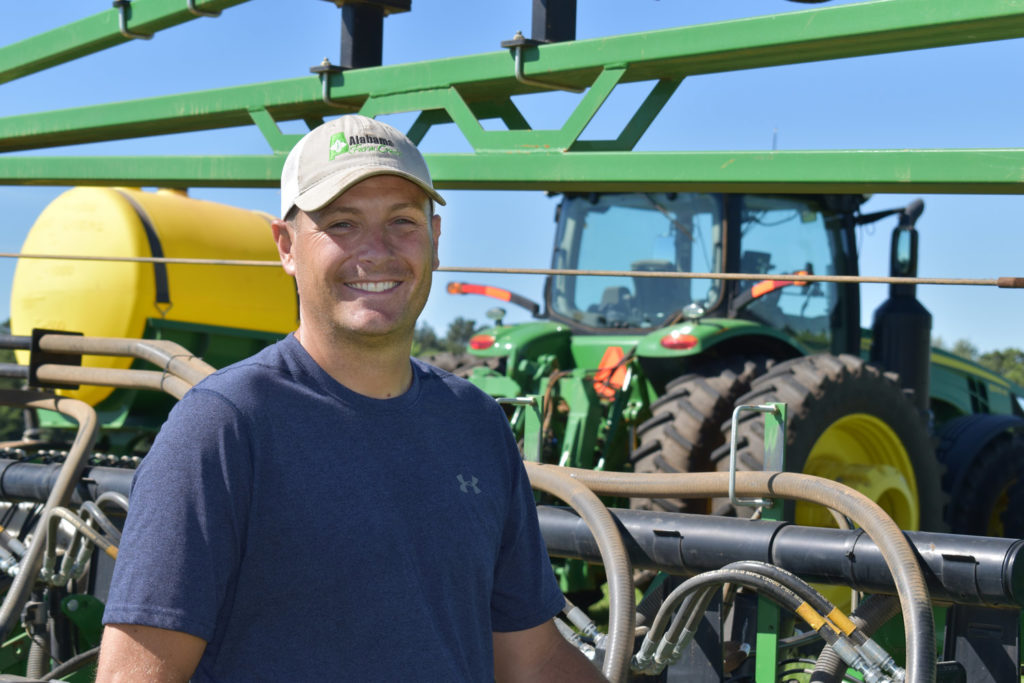Technology And Trials Help Keep Cotton King In Alabama

By Ellie Isbell
Cotton breeding technology is improving so fast, there’s new varieties available each year, and Alabama farmers count on field trials for valuable yield data. Choosing the right seed in spring is critical because the choice can lead to fall harvests flourishing or failing.
Tate Farms in Madison County hosts on-farm variety trials with Auburn University to test for cotton resistance to Verticillium wilt, a problem for many north Alabama farmers. As a result, farm partner Stewart McGill said they maximize yield by planting the top performer in the trials (ST 4747GLB2) in fields prone to the disease.
“New varieties on the market continue to ensure a better fiber, which increases profitability and allows us to produce more lint per acre than we ever could have 10 years ago,” McGill said. “All these characteristics allow American-grown cotton to be the leading product on the world market.”
With new successful varieties, Coffee County farmer Bobby Crutchfield understands the right selection makes a significant difference in harvest profitability.
“I run the cotton gin in town, so I am able to see lots of different varieties, fiber qualities and cotton grading,” said Crutchfield, who grows cotton and peanuts in Geneva. “Every 1-cent profit increase per pound on a bale of cotton adds up to $5. If you’ve got a fiber quality that yields a profit 5 or 6 cents better than a competitor, that’s $25 per bale. If you’ve got 1,000 bales of cotton that’s $25,000.”
A typical bag of cotton seed, including technology fees and seed treatment, is nearly $600, said Dr. Trey Cutts, an agronomist with the Alabama Cooperative Extension System (ACES). He said it’s essential farmers review data from seed companies and university-sponsored trials.
“Extension trials compare multiple companies’ products side-by-side in the same field under identical conditions,” said Cutts, a cotton cropping systems agronomist. “Extension is the best unbiased source for producers.”
Cutts said trials are more important than ever, since the time from research lab to field is getting shorter, and varieties are constantly changing.
ACES conducts variety trials on research stations and private farms across the state.
“On-farm variety trials have a strong set of common market varieties at different farms across Alabama,” said Cutts, who tested common varieties at 20 farms this year.
For farmers like McGill, who grows soybeans, wheat and pumpkins in addition to cotton, trial information is invaluable.
“Trials allow us to make sure the varieties we grow are not only the most profitable in gin turnout, but also allow us to have lower input costs,” he said. “I love to see varieties perform well in trials and show traits against soil-born issues we face.”
Cutts said farmers should review trial data from several locations, whether from a seed company or a university.
“It’s tempting to look at trial results from a nearby location and pick one based on that location,” he said. “Conditions can vary so much from field to field, it’s important to look at high-performing varieties that show stability over multiple locations.”
The real test results come at harvest, which began several weeks ago on most Alabama farms.
Cotton is the state’s most abundant row crop and is grown in 59 of Alabama’s 67 counties. The cotton industry has over a $290 million impact on the state’s economy, and 345,000 acres were grown in 2016.
To view the latest ACES cotton variety trials, visit AlabamaCotton.com.
